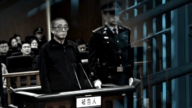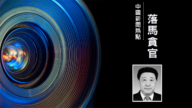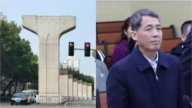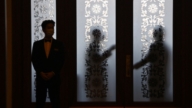【新唐人2013年10月18日訊】最近中共各地都在隆重紀念習仲勳冥誕100週年,中共各大喉舌爭相報導,大讚習仲勳銳意改革,不畏強權,左派右派紛紛發表感言。這種隆重而有些異常的紀念,究竟是為何,我們看看專家的解讀。
15日在人民大會堂,中共高調舉辦紀念總書記習近平父親習仲勳百歲座談會,包括毛澤東、劉少奇、鄧小平、李先念、楊尚昆等的後人,至少有逾百名太子黨出席,甚至高崗的遺孀李立群都有出席。在央視播出的節目中,溫家寶等主張改革的所謂開明派也露面講話。
時政評論家藍述:「實際上官方宣傳習仲勳的目的,是為了加強習近平的在黨內的權威,維持中共的統治地位,這樣做,對於緩解中國社會黨民之間深刻的矛盾,正面的作用更多一點。」
原大陸史學教授劉因全:「無論左派也好,右派也好,無論希望中國改革開放的也好,還是希望倒退到毛澤東時代的人也好,他們都想藉助這個事件來向習近平施加壓力。」
相比之下,習仲勳算是中共黨內極少數開明的人士,在文革期間受到殘酷迫害,長達16年之久,復出後在廣東主持經濟改革。80年代末,又因為同情六四民主運動,替胡耀邦辯護,遭到鄧小平冷落。
香港《開放》雜誌總編輯金鐘:「在這個時候捧習仲勳,也就說明他習近平今天的權力來源的合理性,合法性。」
由於其父顛簸的經歷,以及習近平文革期間,被迫回到陝西農村老家務農,這些經歷為習近平上位增添了幾分傳奇色彩,給不少人帶來了幻想。
習近平剛剛掌權的時候,他宣揚要把權力管進籠子裡,對黨內腐敗嫉惡如仇等等,引起更多期待。
但今年初的南周事件,開始使人們的希望慢慢破滅。五月份,反憲政言論登堂入室,不久,推動公民運動的人士,包括許志永,郭飛雄,王功權等陸續被抓,隨後習近平用毛式理論和語言,進行“整風”,“批評與自我批評”,還出現了省委常委互相揭短的“文革批判”場面,一系列箝制言論行動步步升級,令很多人大失所望。
原大陸史學教授劉因全:「習仲勳是受毛澤東及左路線迫害的,這是一個鐵的事實,但是令人遺憾的是,他的兒子習近平上臺以後,還在對毛澤東頌揚有加。」
馮崇義和楊恆均兩位學者,在《財新網》發表文章說,今天,我們紀念習仲勳,是紀念他執政春秋中,不畏強權與強人﹔是紀念他晚年反思覺醒,為受苦受難的中國民眾拍案而起。
採訪編輯/劉惠 後製/周天
What Is The Real Purpose of the Grand Memorial
of Xi Zhongxun?
Recently the Chinese Communist Party (CCP) held activities
across China to commemorate the 100th Anniversary of
Xi Zhongxun’s birth.
The CCP major mouthpieces are competing to praise
Xi Zhongxun’s sharp will and courage to reform.
Leftists and Rightists all gave speeches.
This grand memorial is somewhat unusual.
On October 15th, the CCP held a high-profile symposium
in the Great Hall to commemorate Xi Zhongxun, father of
CCP general secretary Xi Jinping.
More than 100 princelings attended the event.
These including descendants of Mao Zedong, Liu Shaoqi,
Deng Xiaoping, Li Xiannian, Yang Shangkun and others.
Even Gao Gang’s window Li Lichun attended.
In CCTV’s broadcast, Wen Jiabao and other so-called liberals
who advocate reform made appearances and gave speeches.
Political commentator Lan Shu: “CCP’s propaganda on
Xi Zhongxun is to strengthen the authority of Xi Jinping
inside the CCP.
This is to have some positive impact to mitigate the deepening
contradiction between the CCP and the Chinese people."
Formal Professor of History Liu Yinquan: “Leftists or
Rightists, those who support reform or those who want to
go back to the Mao era, all want to take advantage of this
event to exert pressure on Xi Jinping."
Xi Zhongxun was one of the few open-minded
Senior CCP leaders.
He was brutally persecuted during
the Cultural Revolution for 16 years.
When he returned he talked boldly about
reform in Guangdong.
In the late 1980s, he was sympathetic
to Tiananmen Students Protest.
he was ignored by Deng Xiaoping for
Defending Hu Yaobang.
HK’s Open magazine editor Jin Zhong: “To praise Xi
Zhongxun at this time is to showcase Xi Jinping’s power
as reasonable and legal."
Xi Zhongxun’s experiences and Xi Jingping’s experiences
of returning to the countryside in Shanxi Province during
the Cultural Revolution added some legendary flavor to Xi
Jinping.
When Xi Jinping came to power, his preaching about
locking power inside the cage and his hatred toward corruption
caused quite a lot of expectations from the outside world.
After the Southern Weekly incident earlier this year,
people began to lose hope.
In May, anti-constitutional propaganda took the stage.
Soon after, civic rights activists including Xu Zhiyong,
Guo Feixiong, Wang Ligong, etc. were arrested one by one.
Then Xi Jinping started the “rectification" movement
copying the Maoist theory and language, even including
“criticism and self-criticism" leading to provincial standing
committee members criticizing each other.
This series of escalating actions in suppression
made many people disappointed.
Liu Yinquan: “Xi Zhongxun was persecuted by
Mao Zedong’s leftist policy. This is a hard fact.
But unfortunately, after Xi Jinping came to power,
he still praises Mao Zedong."
Feng Chongyi and Yang Hengjun published an article
in Caixin, which read:
“Today we commemorate Xi Zhongxun to remember his
defiance against strong power.
We recall his reflections and awakening in his later days
and speaking up for the suffering Chinese people.
We honor his ‘humanity-oriented’ and ‘people-oriented’ path,
and his serious reflection on the party and the country.
NTD reporter Liu Hui






























